

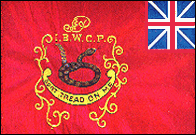
As the wild American scribbler stumbles off into the sunset in search of a pub, I return to Hong Kong refreshed and enjoying the experience of learning what I have missed from my own diary. If my illustrious substitute is to be believed, only two noteworthy events have occurred in my absence.
First, the Great Siege of Disneyland, in which a handful of plucky security guards withstood several days’ assault by a multitude of vicious Mainland children and their parents. Who would have thought this tacky tourist attraction would propel Hong Kong into the ranks of Bothwell Castle, the Alamo, Malta and Leningrad? More to the point, there is the tantalizing possibility that the damage to the Big Lychee’s reputation as a leisure destination will have broken the back of our parasitical tourism industry once and for all, raising the glorious prospect of a permanently visitor-free city. In which case, Tung Chee-hwa’s HK$385 billion subsidy to Disney will have been money well spent.
Second, the death threats and fire bombings that followed the publication of Danish cartoons portraying Islam as violent. The best reason I can see for lynching the cartoonists is that their work is not funny. It is interesting that the newspapers carrying the offending images were mostly from continental Europe, with the English-speaking world maintaining an aloof distance. Compared with the UK’s Steve Bell or the Australian-US Oliphant, European cartoonists like Plantu can’t balance wit with venom, nor can they draw. Like shareholder capitalism, rock music and Middle Eastern military expeditions, political satire is probably something the continentals should leave to the Anglos. (Why did the Angles leave Denmark in the first place? There must be a connection.)

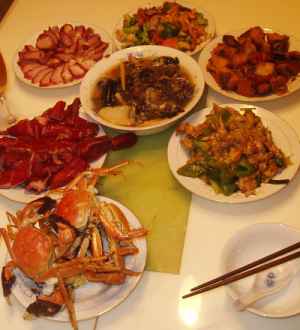
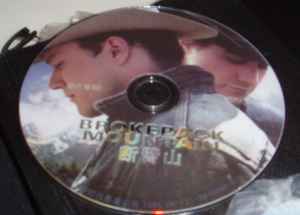
Eaten to the sound of fireworks being thrown from the windows of 100 30-storey apartment blocks, the Chinese New Year’s Eve feast was a Hunanese housemaid’s attempt at Cantonese food. Clockwise, from bottom left – crab, roast duck, ham, pork liver, fish, frog and (centre) something the cat wouldn’t eat involving fish heads.
Breakfast the next day of tong yuen – sesame rice balls in sweet ginger soup.
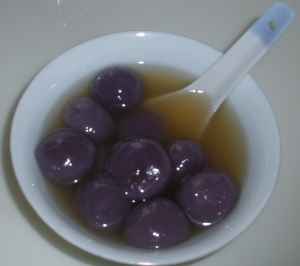
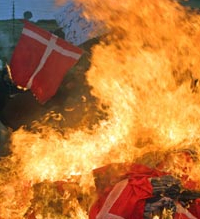
Never in the history of human discourse has anyone been persuaded to change his mind through insults. Will this prove to be a first time – or will the battle between militant Muslims and confrontational cartoonists drag us all into a final fight between the Islamic and Western civilizations for the right to rule the planet? For every artistically challenged Scandinavian needling Mohammedans to show he can, and for every mouth-frothing, deranged Syrian stoning Norwegian consular facilities, there are dozens of people who would prefer a quieter life, and a few voices of reason. So I confidently predict that neither Armageddon nor global brotherly love is in prospect, and before long we will all go back to detesting each other in peace. Meanwhile, how can the clever and nimble among us make money from this? Watching the news reports, it seems obvious to me that there is a pressing shortage of Danish flags in the Middle East. The limited supplies of this uncommon and normally inessential commodity have all been burnt or trampled, and angry mobs are forced to fashion their own, often with disappointing results – the white cross is too thin, or the red background too pale. It is a golden market opportunity – no doubt the quick-witted Cohen-Patel-Chan Trading Co Ltd of Kowloon Bay has beaten me to it.
Wed, 8 Feb
Yuet Yuen Restaurant, Central’s last retail outlet selling goods and services aimed at Hong Kong residents rather than tourists, lives on. Mrs Ng’s threats to sell the place or lease it out, so it could become the neighbourhood’s 93rd purveyor of overpriced scented candles, or yet another quasi-clinical temple to the goddess of skin-whitening, seem to have been empty – the ramblings of a cantankerous old woman whose life would be meaningless without customers on whom she can lavish congee, noodles and rudeness every morning.
Wiping the Formica tabletop clean of the tea spilt by our grumpy hostess, shapely Administrative Officer Winky Ip listens carefully as I ask her the question that is on everyone’s lips. How does the Big Lychee maintain communal peace? Elsewhere, the media print crude images of a bomb-wielding, psycho-prophet Mohamed. Rumours that Danes are burning Korans are almost certain to put ideas into freedom-loving Scandinavians’ minds. And Muslims march in the streets chanting, “Islam is not a religion of violence and if you say it is we’ll kill you!” But the Big Lychee is spared this ‘dialogue of civilizations’.
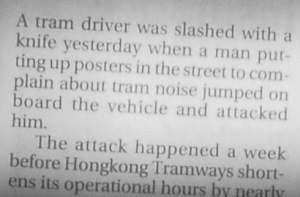
I vaguely recall something along those lines. “The Government naturally took firm action,” Winky goes on. She sighs as the treasured memories come back. “We had a 642 million dollar budget for a three-phase public education campaign. Essay writing competitions for children. The ‘It’s a blessing that we meet’ TV commercial…” She bursts into song…
We are one family!
Just a little bit of effort
can make a big difference!”
“…Special ‘Mutual Respect and Communication’ T-shirts distributed by Social Harmony Ambassadors. Cantopop stars visiting schools and eating curry. Posters encouraging old ladies to be nice to brown people...” Winky smiles and gazes into the distance, lost in a daydream about civil servants fulfilling their mission to spread light and hope among the ignorant savages of the Fragrant Harbour, and single-handedly saving our city from the ravages of race war.
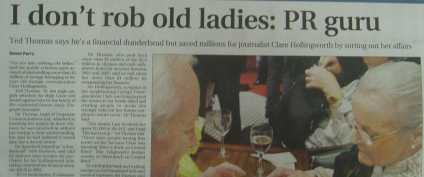

Actually, it’s not interesting at all. Why did I write that? Perhaps senility is contagious.
Thurs, 9 Feb
To dig yourself into a hole, you need land. In Hong Kong, all the land is owned by the Government. This explains much.
The Great West Kowloon Cultural Hub Disaster continues to unfold. This is no normal tragedy – it’s not like the tsunami-battered ship full of Chinese coal miners returning from the Haj suddenly running aground into a Manila stadium hosting a TV show featuring Hong Kong tourists in Egypt.. This is in slow motion. It could be seen coming years ago, back in the dark days when Tung Chee-hwa became afflicted with an acute nervous disorder that resulted in a reflexive nod of the head whenever the word ‘hub’ was mentioned. The crop-haired one was also suffering from an unfortunate cognitive flaw that led him to confuse tycoons’ interests with Hong Kong’s. Thus the insensible Tofu-for-Brains babbled a decree transferring 100 acres of prime waterfront land – intended by his British predecessors to be a park – to developers. In a flimsy attempt to give the scam a veneer of public benefit, the latter would toss in a few threatres and museums among their monster towers full of luxury apartments and malls. Meanwhile, a vast canopy covering half the site was added to the visionary plan. Some said this was an attempt by valiant civil servants to limit the scale of this loss of public wealth to the property cartel by imposing a de-facto height restriction on buildings. Others said it was the work of evil developers keen to preserve the harbour views from projects already planned to the north of the reclamation. Another theory was that, when told the structure would be visible from outer space, Tung was gripped by a nodding fit that lasted a week.
After the restoration of Rule by Arrogant Civil Servant in mid-2005, the size of the giveaway was scaled back, to the point where developers’ returns would be mildly rather than breathtakingly obscene. Some property barons even showed signs of losing interest. With the original object of the exercise – a massive gift to the cartels – now half-abandoned, the theatres and museums have even less purpose. The colonial-era park idea lives on, courtesy of impertinent busybodies who prefer trees to concrete. But Secretary for Lands Michael Suen doggedly persists in pushing the culture hub relic forward. It might be a stupid concept, but it has had too much work put into it now, he explains, as he digs away.
Fri, 10 Feb
In Pacific Place mall, boutiques rush to order additional supplies of pricy, grotesque-looking ladies’ footwear as Imelda Marcos gets permission to grace the Big Lychee with her morbid and increasingly dumpy presence for a medical check-up. I recall visiting Malacanang Palace soon after she and her murdering husband fled to the USA. Her dressing table mirror was framed by a dozen 60-watt bulbs, Hollywood starlet-style, and had a five-gallon carboy of Chanel No 5 next to it. But in her bedroom, there were no reading lights. Her ridiculous wardrobe – miles of silk, tons of sequins and acres of leather – occupied the whole basement. Half a mile away, naked children washed in the stinking, pitch-black waters of the Pasig River while their parents picked through piles of rotting trash in the crumbling streets. In Hawaii, gleeful Filipinos tossed old shoes over the wall of the luxury villa that served as her bolt-hole. And now, in my kitchen in Perpetual Opulence Mansions, the two elves chatter away excitedly, hoping to catch a glimpse of this creature whose kleptomania condemns them to washing Hong Kong dishes for a living, and whom, of course, they idolize.

Include the pre-sequel Cryptonomicon, which takes place in World War II and the present day, and the whole opus comes to 3,543 pages.
Then, for light relief, as a result of a judicial review launched by Honourable Member of the Legislative Council Long Hair Leung Kwok-hung, the courts declare that our still-ever-vigilant Government can employ unconstitutional means of wiretapping for six months. Can the rest of us break the law from now until mid-August as well? If so, I will have to think hard about which crime to commit. Throwing Imelda Marcos off the third floor at Pacific Place would be tempting.